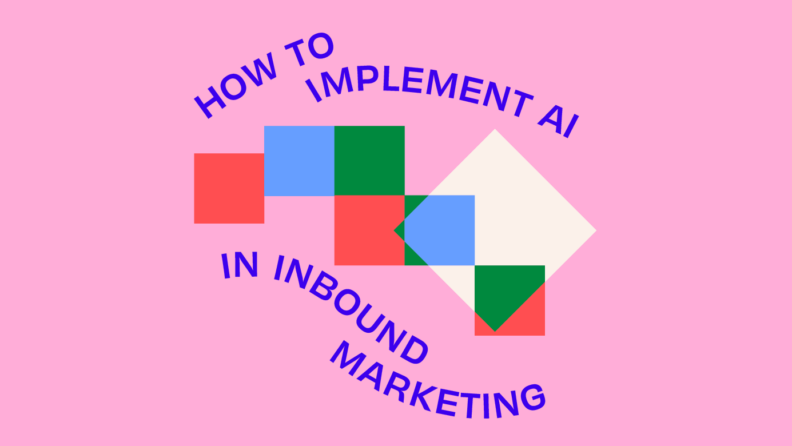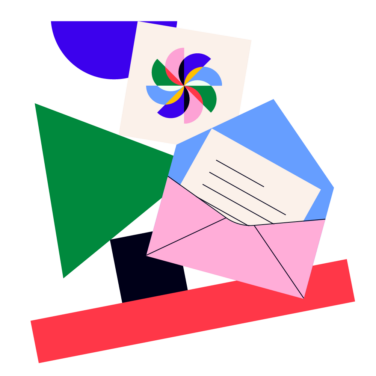Just when you think as marketers we may be able to take a breath, a new player has emerged from the labs. Decades of algorithmic training, model development and proposed applications have landed with fanfare of both excitement and fear.
In this brave new world, businesses are constantly seeking out new strategies to attract, engage, and convert their target audience. Among these strategies, inbound marketing has long been established as a powerful approach that focuses on creating valuable content to draw in potential customers.
However, as the competition continues to intensify, businesses need to stay ahead of the curve. This is where artificial intelligence comes in. By leveraging AI, businesses can significantly (and dynamically) improve inbound marketing efforts, making them more efficient, personalized, and effective.
I have spent the past 15+ years of my career continually keeping up on the “next big thing” in marketing. From search engine algorithms to social media marketing and now, to handshaking integrated marketing campaigns with the robotic hand of AI. I find myself with my eyes continually pointed forward to evaluate what will drive engagement, conversions and ROI across the funnel for clients and companies.
The Recent Rise Of The Machine
As far back as there have been stories, there has been the spark of imagination in implementing the human touch and experience into something more technologically advanced. The field of AI has seen remarkable progress in recent years, marked by significant advancements in deep learning and artificial predictive neural networks. Here are some key milestones that underscore this rapid evolution:
In 2016, a landmark event occurred when Google's AlphaGo triumphed over the world champion in the intricate game of Go. This victory underscored the potential of AI in complex decision-making scenarios.
Fast forward to 2022, AI tools such as ChatGPT, DeepMind, and Midjourney made headlines by generating text, code and imagery, and firmly cementing terms like bots, natural language processing and automation into our brains. The deep learning models began pushing the boundaries of narrow AI and inching closer to the realm of what is known as artificial general intelligence.
By 2023, influential figures like Bill Gates were emphasizing the transformative potential of AI, highlighting its capacity to boost productivity and revolutionize various industries.
The journey of AI, from its theoretical beginnings to the advanced deep learning methodologies of today, is a testament to its rapid and ongoing evolution. This timeline of AI achievements underscores the remarkable strides made in the field, hinting at an even more promising future.
So... What does ChatGPT, chatbots and these AI-powered automations mean for you? Let’s take a look at how it fits into inbound marketing.
Understanding Inbound Marketing
Inbound marketing is a customer-centric approach that involves attracting potential customers through the creation and distribution of valuable, relevant content. Unlike traditional outbound marketing tactics, which involve pushing a product or service onto consumers, inbound marketing is about pulling in customers by providing content that addresses their needs and interests.
The primary goal of inbound marketing is to attract, engage, and delight customers, transforming them from strangers to promoters of your brand. We have all heard the analogy of this cascade of conversion rates as a funnel. Let’s take a look at the core tiers of campaign optimizations:
- Attract: At this stage, businesses aim to draw in potential customers by creating engaging content that resonates with their needs and interests. When we’re thinking of tactics at the attraction or awareness phase, we’re traditionally talking about your SEM, SEO, social media campaigns, both organic and paid with the singular goal of pulling visitors and potential customers into your orbit.
Tools that fall into this category are Grammarly and the Content Strategy tool by Hubspot - Convert: Once attracted, the goal is to convert these visitors into leads by encouraging them to share their contact information, typically in exchange for more valuable content or offers. If you have done your research right and utilized your customer data from your CRM of choice, at the convert phase you’ve placed use cases in the form of whitepapers, webinars, or for e-commerce this could fall to product recommendations based on the search intent or customer behavior.
Tools that fall into this category are Sales Professional by Hubspot, OneSpot and Cortex - Close: This stage involves nurturing these leads and persuading them to make a purchase, effectively transforming them into customers. In the mid-low funnel, messaging shifts more from curiosity to full on customer behavior analysis and where they are in the buying cycle.
An example of such a tool is Seventh Sense - Delight: Even after a purchase, businesses continue to engage with customers, if you’ve struck a chord those potential customers could very soon be your own advocates and influencers.
Tools that fall into this category are Motion AI and Klevu
Despite its effectiveness, inbound marketing can be time-consuming and complex, requiring a deep understanding of the target audience and the constant creation of tailored content.
Is this where AI tools could come to the rescue? Could AI help businesses automate and optimize their messaging, processes, and the funnel of an inbound marketing strategy?
Embracing AI In Inbound Marketing
AI, and the algorithms that surround it, can perform tasks that would normally require human intelligence. These tasks can range from understanding natural language and recognizing patterns to learning from experience and making decisions.
In the context of inbound marketing, AI can be leveraged to automate repetitive tasks, analyze large volumes of data, personalize user experiences, and much more. By incorporating AI into their inbound marketing, businesses can not only save time and resources but also enhance the effectiveness of their efforts.
Implementing AI In Inbound Marketing
AI has the potential to revolutionize inbound marketing in several ways. Here we explore some of the key areas where AI can make a significant impact, and how you can implement AI in your own inbound marketing strategy.
AI for Personalized Customer Engagement
One of the fundamental aspects of inbound marketing is to engage customers on a personal level.
What if through AI-powered tools, your marketing analysts could understand the needs and interests of individual customers? What if businesses can tailor their content marketing and offers to resonate with them in ads and on landing pages?
What if some of this time-consuming process could be done – on its own?
AI can facilitate this by analyzing consumer behavior and data, and generating personalized content and recommendations. For example, AI-powered chatbots can crawl your website, similar to a search engine, and provide tailored responses to customer queries, delivering a highly personalized and engaging user experience.
It's a 24/7/365 presence on your website, app or platform that not only understands your business but can respond intelligently to a customer or potential customer and get them into your workflows.
ChatGPT Prompt Example:
I want you to act like a Social Media Manager, with core experience in managing platforms such as Facebook, Twitter, LinkedIn and TikTok. Based off my <business or niche> I want you to suggest a 30-day content calendar. Present the post information, platforms and relevant hashtags in a table for easy legibility.
AI for Automated Lead Generation
Lead generation plays a critical component of inbound marketing.
At the top of our favorite funnel, there are solutions such as AdCreative.ai to generate ad designs at scale and Copy.ai to accelerate the development of ad copy and website content.
AI can automate this process by setting up automated conversations with website visitors, capturing key information such as email addresses and contact details. For instance, AI-powered CRM systems can identify high-quality leads based on a contact's history of interactions, automatically notifying sales reps of the most important updates and events.
ChatGPT Prompt Example:
I want you to act like a Digital Marketing Manager, with expertise in search engine optimization, ranking algorithms and webpage content structure. I want you to generate landing page content for my <business or niche> and the structure of the page should be <outline the structure of the page>.
AI for 24/7 Customer Support
Providing round-the-clock Customer Support can significantly enhance the customer experience, but it is often not feasible for businesses to have human representatives available at all times. AI can fill this gap by providing automated customer support. AI-powered chatbots can handle common customer queries, suggest resources and provide immediate responses, freeing up Customer Support teams to handle more complex issues.
Imagine a 24/7/365 presence on your website that can feed your Support and Sales teams real-time, factual customer behavior and free up their respective time for higher-value tasks.
ChatGPT Plus Prompt Example:
I want you to act like a Customer Support Manager. I want you to review my website <paste URL> and provide suggestions on questions to add to a chatbot to deal with frequently asked questions. Categories or suggestions to focus on would be our <products, services, pricing, contact methods>.
AI for Content Creation and Curation
Creating and curating high-quality, relevant content is a critical aspect of inbound marketing. However, this can be a time-consuming and challenging process. AI can automate and streamline this process, using natural language processing (NLP) and machine learning techniques to generate content, recommend topic clusters, and even optimize content for SEO.
Powerful AI-powered tools like Perplexity.ai can provide context and references, while frameworks like ChatGPT can be used to plan social media content calendars, search engine landing page frameworks and infinite blogging ideas.
Tools like Grammarly, Automated Insights, and HubSpot's Content Strategy tool can assist in automating and enhancing content creation and curation, while sales-focused tools like Lavender will help you write sales emails that are opened and replied to at scale.
ChatGPT Plus Prompt Example:
I want you to act like a Content Marketing Manager. Based on our <company or niche> I would like you to review our website <insert URL> and come back to me with a high-level understanding of our website. From that compile a list of the 10 most valuable keywords based on competition and monthly searches.
Finally, from those keywords come back to me with a 6-month blogging calendar of blog titles that use your suggested keyword themes.
AI for Enhanced User Experience
AI can significantly enhance the user experience on a website.
By providing personalized and engaging responses to website visitors, businesses can create a more immersive and interactive user experience. This can help businesses improve customer retention and reduce bounce rates for tactics such as SEO.
At the design-level, that level of customer data can then be quickly iterated on and deployed with well-known tools like Figma and Framer.
ChatGPT Plus Prompt Example:
I want you to act as a Director of SEO for our <company or niche>. You should be an expert in SEO best practices and algorithms. I would like you to review our website <insert URL> and come back to me with a list of improvements that we could potentially make to improve our customer experience while optimizing our website to be more effective to the crawlers.
Harnessing The Power Of AI for Inbound Marketing: Practical Steps
While the prospect of integrating AI into your inbound marketing strategy can seem daunting, it can be achieved through a systematic approach. Here are some practical steps to get started:
- Identify Areas for Improvement: The first step is to identify the areas within your inbound marketing strategy that could benefit from AI. These could include content creation and curation, lead generation, customer engagement, or customer support.
- Research AI Tools: Once you have identified the areas for improvement, research the various AI tools available that can address these areas. Some useful AI tools include Grammarly, Content at Scale or Jasper for content creation, HubSpot for lead generation and customer engagement, and Motion AI for customer support.
- Test and Implement AI Tools: Once you have identified suitable AI tools, test them to see how they can enhance your inbound marketing efforts. Make sure to evaluate how well they integrate into your current marketing tech stack. This will give you a better understanding of how these tools work and how they can benefit your business. Once you are satisfied with the results, you can roll these tools into your inbound marketing strategy.
- Monitor and Optimize: Once you have deployed AI into your inbound marketing, it's important to monitor the results and continuously optimize your approach. AI tools can provide valuable insights and data that can help you refine your marketing strategy and improve your results over time.
Iterate. Monitor. Optimize. Repeat. But as marketers... You already knew that part.
Embracing The Future Of Inbound Marketing
It’s hard to believe the world that is appearing before us. The very fabric of science fiction.
In an increasingly digital world, businesses will continually need to stay ahead of the curve to succeed. By embracing AI, businesses can significantly improve inbound marketing efforts, delivering more personalized, engaging, and effective experiences for their customers.
The future of inbound marketing is here, and it's powered by AI. By integrating AI into your inbound marketing strategy, you can not only enhance the effectiveness of your efforts but also position your business for future success.
If you enjoyed this article, leave a comment to continue the conversation. Feel free to ping me on LinkedIn, and of course sign up for The CMO newsletter for more on AI, inbound marketing, and our recommended tools.



